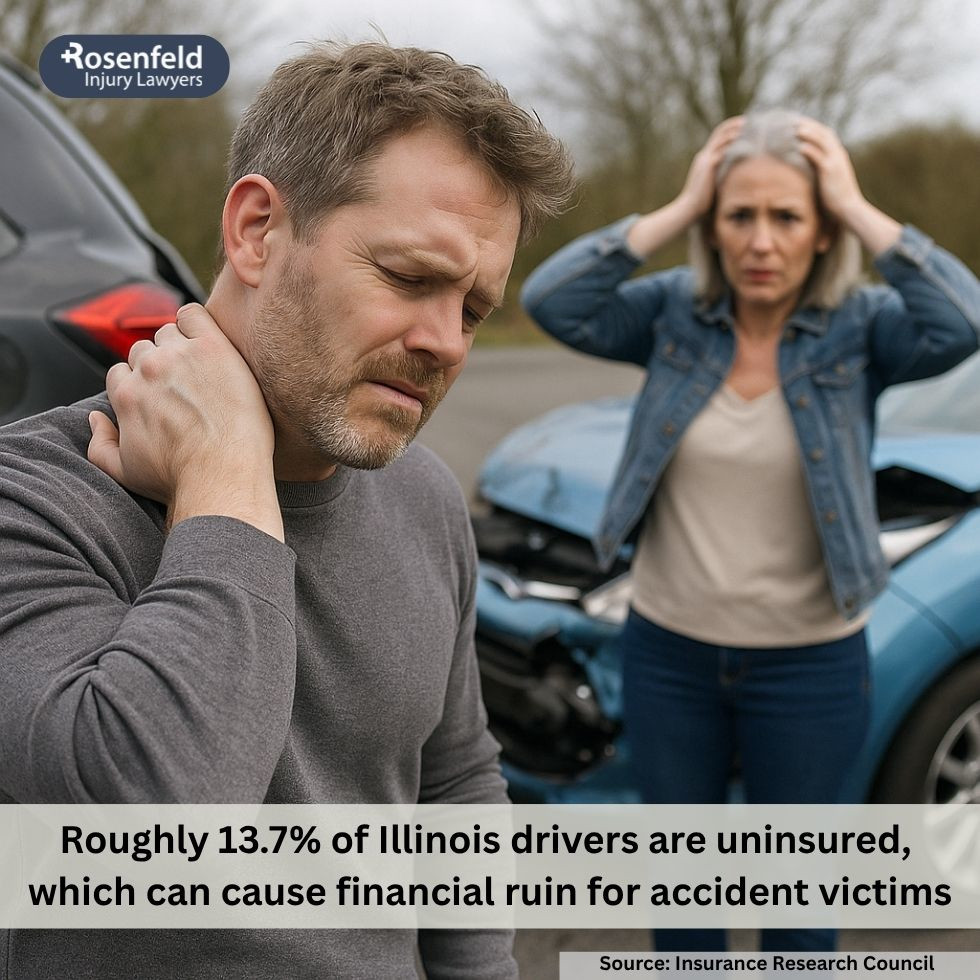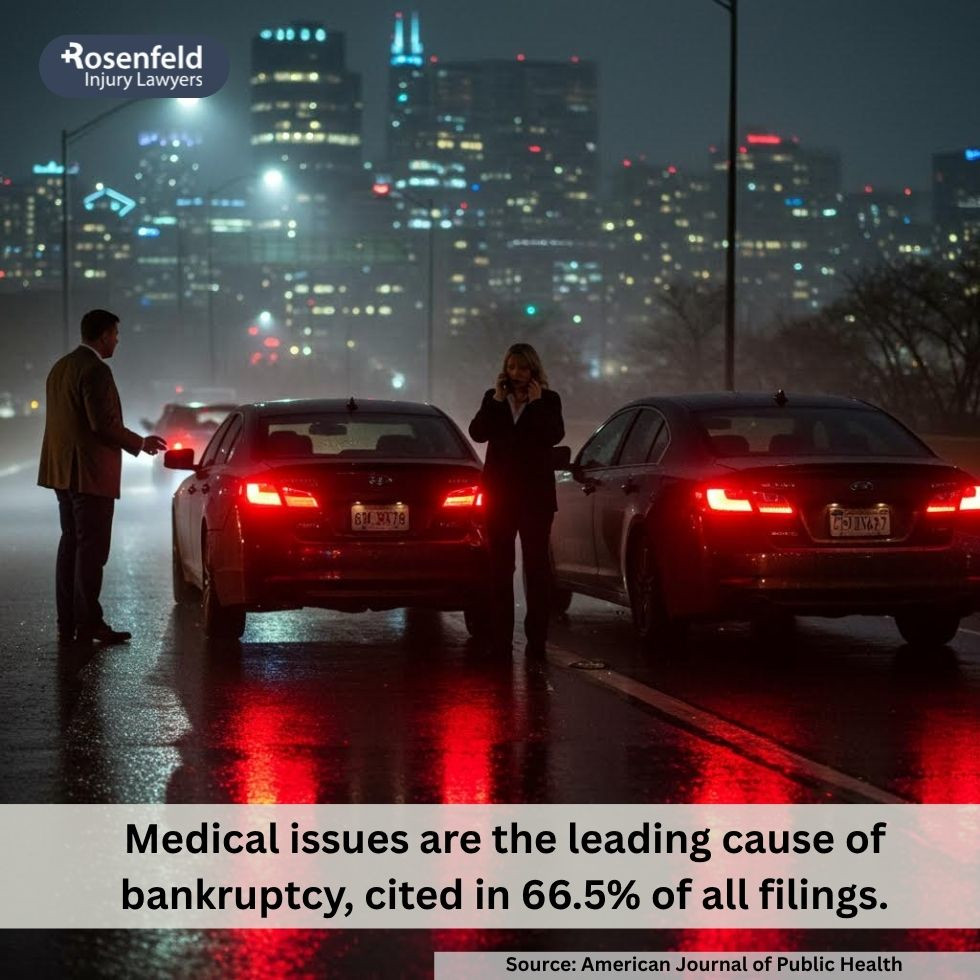- 24/7 Free Consultation: (888) 424-5757 Tap Here To Call Us
Illinois Car Accidents and Bankruptcy

This article explores how car accidents and bankruptcy intersect under Illinois law. Whether pursuing a personal injury claim or trying to avoid losing everything to creditors, understanding how one legal process affects the other is essential.
With the proper legal guidance from an experienced car accident attorney, protecting your financial recovery and working toward a fresh start is possible.
Serious car accidents can change lives in an instant—and not just physically. For many injured Illinois drivers or passengers, the financial consequences last far longer than the crash itself.
Mounting medical bills, missed paychecks, car repairs, and long-term treatment often place an overwhelming burden on a person’s finances. When insurance coverage isn’t enough—or claims drag on—some victims feel cornered into considering bankruptcy just to stay afloat.

How a Car Accident Can Lead to Bankruptcy
An auto accident doesn’t just leave physical injuries—it can also lead to severe and immediate financial hardship. In the aftermath of a crash, victims often face a cascade of expenses that quickly become overwhelming. These may include high medical bills for emergency care, hospitalization, surgery, or ongoing medical treatment such as physical therapy.
Many injured individuals also deal with lost wages due to time away from work, as well as car repair or replacement costs if their vehicle was totaled. In more serious cases, victims suffer long-term or permanent disabilities that prevent them from returning to their jobs, compounding the economic pressure.
Even with car insurance, many people face coverage gaps that result in significant out-of-pocket expenses. As bills pile up and income decreases, it’s common to fall behind on credit card debt, car loans, and basic living costs.
A single unexpected medical bill can start a financial spiral for those already living paycheck to paycheck. While a personal injury lawsuit may offer compensation down the line, the delay often leaves victims considering bankruptcy as a last resort.
The Bankruptcy Estate and Your Personal Injury Compensation
When you file for bankruptcy, all your current and future assets may become part of the bankruptcy estate. This includes the right to collect money from a pending personal injury case, even if you haven’t yet received a settlement check or court award.
Under Illinois bankruptcy law (735 ILCS 5/12-1001), certain personal injury settlements are protected from creditors. For example, up to $15,000 of a personal injury award related to bodily harm may be exempt. But, damages related to lost wages or property damage might not be protected in the same way.
This means that a bankruptcy trustee could claim a significant portion of your compensation to pay creditors unless your case is handled carefully. Failing to disclose a pending personal injury suit in a bankruptcy petition could result in severe penalties, including loss of the entire claim or accusations of fraud.
When to File Bankruptcy After a Car Accident
Timing matters. If you’re considering filing for bankruptcy, the status of your personal injury claim will heavily influence your legal strategy.
Filing before a settlement: The trustee may control the case if you declare bankruptcy while your personal injury claim is pending. Any settlement funds may go toward paying creditors, depending on exemptions and the type of damages.
Filing after receiving compensation: If you’ve already received a personal injury claim settlement, it becomes part of your bankruptcy estate. The court will decide how much you can keep and how much must be used to repay debts.
Filing too early could jeopardize your right to compensation. Filing too late may expose funds you would have otherwise protected. A knowledgeable personal injury attorney working alongside a bankruptcy attorney can help coordinate timing and preserve your legal rights.
What Happens to a Car Accident Claim in Chapter 7 Bankruptcy
In Chapter 7 bankruptcy, your non-exempt assets may be liquidated to pay off unsecured debts like credit card bills, medical expenses, or personal loans. That includes personal injury lawsuits or settlements in progress.
If you’re pursuing a personal injury case, the trustee might take control of the claim. Any funds received could be used to pay your creditors, with only the exempt portion protected under Illinois law.
On the upside, Chapter 7 bankruptcy may allow you to eliminate certain debts related to the accident, such as medical bills or a car loan, especially if the vehicle was totaled and no longer has value. Whether you can keep your car depends on whether the debt is secured and whether you’re current on payments.
What to Expect in Chapter 13 Bankruptcy After an Auto Accident
Chapter 13 bankruptcy allows you to keep your property while repaying debt through a structured repayment plan, typically over 3 to 5 years. This type of bankruptcy filing can be a better option for injured parties who have regular income and want to protect certain assets like their motor vehicle or home.
If you’re involved in a personal injury suit, any resulting settlement may need to be reported to the bankruptcy court. The court might require that part or all of the compensation be used to repay debts through your plan.
Unlike Chapter 7, Chapter 13 gives you more control and flexibility, but it also means longer oversight by the court and trustee. Some car accident victims choose Chapter 13 specifically to protect a car accident claim or postpone debt obligations while focusing on recovery.
What If the At-Fault Party Files for Bankruptcy
In some cases, it’s the at-fault party, not the victim, who files for bankruptcy. This can create complications in your effort to recover compensation through a personal injury lawsuit.
Once a defendant files for bankruptcy, the automatic stay provision under the bankruptcy code halts most legal actions, including car accident claims. However, you may still be able to proceed if:
- The claim is covered by the at-fault party’s insurance policy, allowing you to pursue compensation through their insurance company.
- The claim falls under an exception, such as willful or malicious injury, which may be non-dischargeable under Section 523(a)(6).
- Other parties—such as employers, contractors, or product manufacturers—can be held liable for your injuries.
A knowledgeable attorney can help you explore your legal options if bankruptcy threatens your ability to recover damages.

Why You Need Both a Personal Injury and Bankruptcy Attorney
Car accidents and bankruptcy involve two different legal systems, but they often overlap in ways that can affect your financial future.
If you’ve been injured in a crash and are also dealing with overwhelming debt, it’s critical to have both a personal injury lawyer and a bankruptcy attorney working together. Without coordination, you risk making decisions that could reduce or eliminate your right to compensation.
For example, you could unintentionally forfeit your personal injury settlement, fail to disclose your car accident claim to the bankruptcy court, or allow a bankruptcy trustee to take a larger share of your award than necessary. These aren’t just paperwork errors—they can lead to significant financial loss or even legal trouble.
At Rosenfeld Injury Lawyers, we collaborate closely with trusted bankruptcy lawyers to protect clients on both legal fronts. Whether you’re thinking about filing bankruptcy or are already in the middle of a personal injury case, we’ll help ensure everything is handled correctly. We aim to preserve your rights and secure the financial recovery you deserve.
Book a Free Consultation!

If you’ve suffered injuries in a car accident and now face mounting debt or pressure to file for bankruptcy, don’t try to handle it alone. The intersection of personal injury claims and bankruptcy law is complex, but with the right legal team, you can protect your health and future.
At Rosenfeld Injury Lawyers, we understand how a bankruptcy filing can affect your personal injury case and how to preserve the value of your claim. We offer free consultations and work on a contingency fee, meaning you don’t pay unless we win.
Call us at (888) 424–5757 or fill out our contact form to speak with a personal injury attorney in Chicago who understands your crash’s entire financial and legal impact. We’ll help you explore all your legal options and fight for the compensation you deserve—no matter your financial situation.
All content undergoes thorough legal review by experienced attorneys, including Jonathan Rosenfeld. With 25 years of experience in personal injury law and over 100 years of combined legal expertise within our team, we ensure that every article is legally accurate, compliant, and reflects current legal standards.







